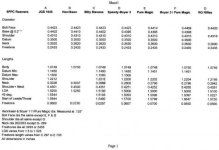Opposite of the above... one of my recommendations to any new shooter who is serious about being competitive in short range BR: wear out the barrel the comes on your first rifle, but buy your own reamer before you start buying more barrels or other knick-knacks. One of the biggest factors in being competitive is having a chamber/brass/die combination that is consistent. You will constantly be chasing problems like hard bolt lift, clicking, hard bolt close, and upsetting the gun in the bags if you don't have good fitting components. This is easiest way to solve this is by starting with a your own reamer, a consistent chambering method, and a custom or semi-custom die specifically matched to your chamber with your reamer.
Likewise, I see guys with a half-dozen or more reamers -- doesn't quite make sense to me unless they have spent an equal amount of effort finding dies to match.
The details of the reamer are practically irrelevant -- pick a neck size, free-bore length, lead angle, and overall cartridge length from the any of the common values or come up with your own magic formula. The important thing will be finding the die that matches the resulting chamber. Then life becomes a search for lot(s) of bullets the work well in that setup.
At the molecular level, one could design a reamer/die combination around a specific bullet made on a specific die with specific jackets, but most of us do not take take consistency to that level. We shoot what we can find so changing lots/brands/shapes/weights of bullets means the reamer won't be exactly as custom as we sometimes wish it was. Don't worry about it. The .001" that it costs is nothing compared to the .100" or .200" that a wind change is worth.
Rod


